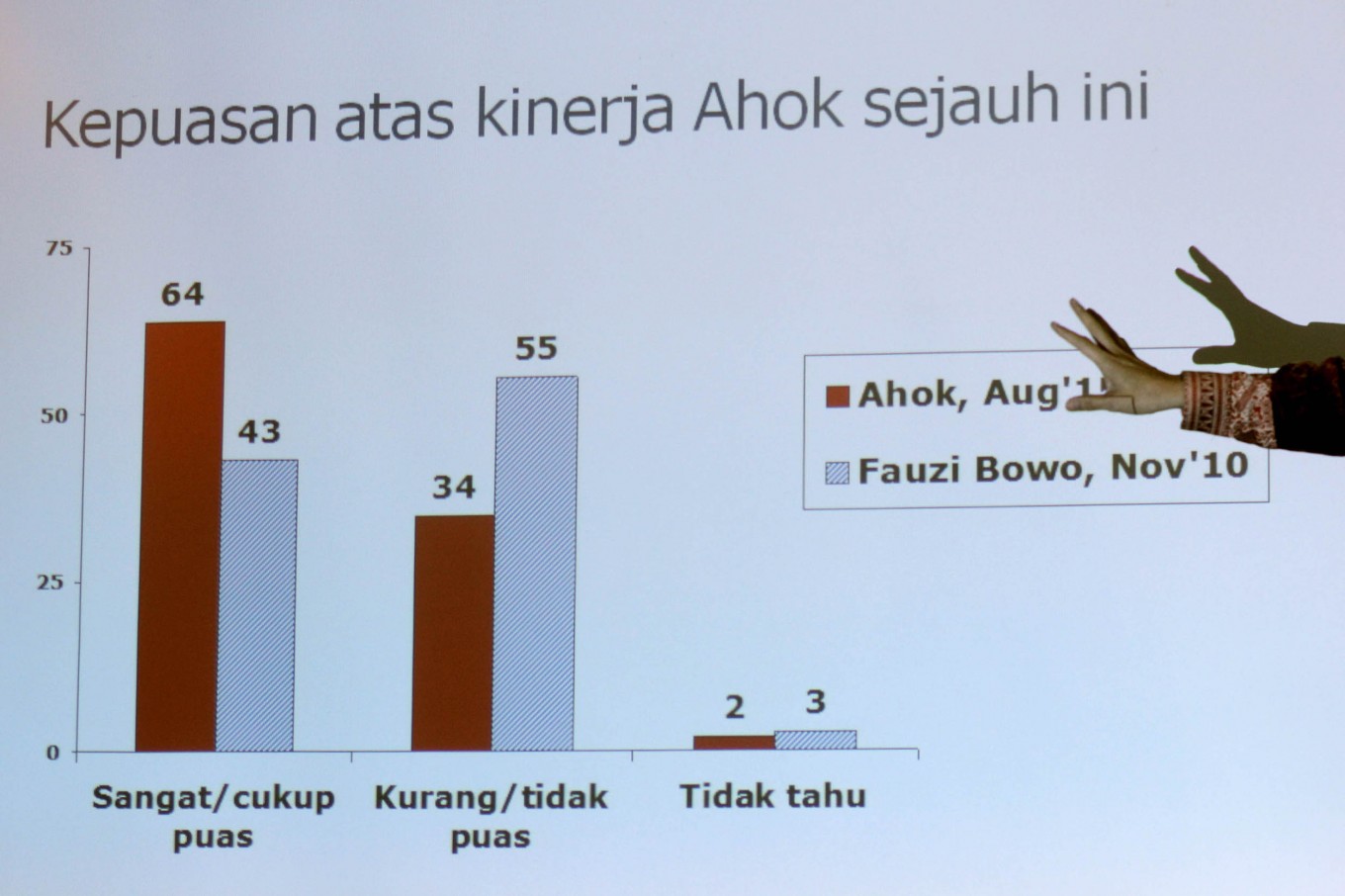Popular Reads
Top Results
Can't find what you're looking for?
View all search resultsPopular Reads
Top Results
Can't find what you're looking for?
View all search resultsOur democracy needs smarter haters
Some haters rejected Jakarta Governor Basuki “Ahok” Tjahaja Purnama, who plans to run for another term in the upcoming gubernatorial election, for his minority background. Contra-haters responded to it by spreading a fairly irrelevant counterargument: “I am a Muslim, and I vote for Ahok.” Had they all been smarter, the debate could have been about the candidate’s accomplishments (or failures) in tackling traffic or flood problems in Jakarta — which is definitely worth the public’s while.
Change text size
Gift Premium Articles
to Anyone
 Contra-haters responded to it by spreading a fairly irrelevant counterargument: “I am a Muslim, and I vote for Ahok.” Had they all been smarter, the debate could have been about the candidate’s accomplishments (or failures) in tackling traffic or flood problems in Jakarta — which is definitely worth the public’s while. (the jakarta post/Wienda Parwitasari)
Contra-haters responded to it by spreading a fairly irrelevant counterargument: “I am a Muslim, and I vote for Ahok.” Had they all been smarter, the debate could have been about the candidate’s accomplishments (or failures) in tackling traffic or flood problems in Jakarta — which is definitely worth the public’s while. (the jakarta post/Wienda Parwitasari)
I
t was the first day of 2016 when President Joko “Jokowi” Widodo visited West Papua. The message was strong: the government wanted to pay more attention to Indonesia’s eastern territory. To raise awareness, photos were posted on the President’s official Facebook page. One of them depicted him sitting cross-legged, wearing a sarong and his favorite white shirt while enjoying sunrise at the Waiwo Beach dock.
For the “haters”, who had consistently and openly undermined his presidency, the visit created momentum for yet more criticism. Indeed, what Jokowi did at New Year could have triggered fruitful debate — whether actual government programs backed up his political preaching, or whether affirmative actions, if any, were sufficient to bring about justice and development in Papua.
However, instead of attacking with a well-researched argument, the haters decided to use a laughable pick-up line: Jokowi’s photo at the dock was photoshopped and fake. It went viral.
This is the epitome of how haters, in general, play out their role in our democracy. Jokowi’s political opponents, too, have haters. Haters all have the same strategy: throwing ludicrous accusations that are unequivocally easy to grasp but strong enough to stir up division. For them, it is a success when the image of the figure they hate is damaged.
What haters do does not have any use for society. But that is part of living in a democracy; we can’t (and shouldn’t) stop anyone, including those who we disagree with, from voicing their opinions. What I can do, however, is remind people how expressing such irrelevant critique can be detrimental not only to our democracy but also to the haters themselves.
Democracy works best when opposition exists. As Lord Acton put it, “power tends to corrupt; absolute power corrupts absolutely”. Opposition is needed, therefore, as a check and balance on whoever is in power. Essentially, this is the same concept as market equilibrium in Microeconomics 101, just a different application.
When there is one seller, it is likely that prices are high and product quality is low. As another seller enters the market, competition emerges and both sellers need to innovate on quality or cut prices to attract buyers. When perfect competition arises, buyers are benefited. In our case, politicians are the sellers and we are the buyers.
Now, suppose haters chime in and begin to circulate a rumor about the personal affairs of one of the sellers. The rumor has nothing to do with the business but is powerful enough to drive that seller out of the market, at least temporarily.
Society, which initially had two sellers to choose from, is now left with only one seller. Who benefits? Not society, not the haters, but the one remaining seller. He dominates the market without needing to lower prices or improve the quality of his products.
Back to our political context, the opposition, which could have come up with promises or proposals to attract voters in the presence of competition, would now offer nothing; his opponent is losing anyway.
Things can still get much uglier. That is, when reactions to haters’ messages turn out to be equally ignorant — resembling what happened in Jakarta just a couple of weeks ago. Some haters rejected Jakarta Governor Basuki “Ahok” Tjahaja Purnama, who plans to run for another term in the upcoming gubernatorial election, for his minority background.
Contra-haters responded to it by spreading a fairly irrelevant counterargument: “I am a Muslim, and I vote for Ahok.” Had they all been smarter, the debate could have been about the candidate’s accomplishments (or failures) in tackling traffic or flood problems in Jakarta — which is definitely worth the public’s while.
Political debates should be about ideas. When they are downgraded to irrelevant critiques, baseless allegations, racist comments and logical fallacies, it is society — which haters are part of — that bears the costs.
We rarely see politicians in our democracy debate on things that truly matter, such as creating more jobs, building world-class research institutions, or establishing a better healthcare system. If this continues, no one will benefit, not even the haters.
Rational haters better start recalculating their game plan and consider upgrading their artillery. By being smarter, they will not only help our democracy prevail but also protect their own interests.
***
The writer is undertaking a Master’s in public policy at the University of Chicago.
---------------
We are looking for information, opinions, and in-depth analysis from experts or scholars in a variety of fields. We choose articles based on facts or opinions about general news, as well as quality analysis and commentary about Indonesia or international events. Send your piece to community@jakpost.com.









